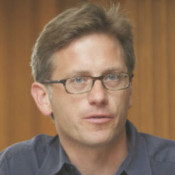Conference Overview
On May 3-5, 2016, Stanford Social Innovation Review hosted leaders from around the world at its inaugural Frontiers of Social Innovation forum to discuss the best ways to build a more inclusive society. Foundation presidents, scholars, social entrepreneurs, government officials, NGO leaders, philanthropists, and business executives explored the most recent research and thinking on the causes of social inequities, and, importantly, the approaches and programs that are proving to be most effective at creating a more economically just world.
Sessions
Equality of Opportunity: Perspectives and Research on Economic Mobility and Inequality
Presentation from this sessionHow can we improve economic opportunities for low-income children? Raj Chetty will discuss findings from the Equality of Opportunity Project, which uses big data to develop new answers to this important and timely policy question. The presentation will show how children’s opportunities to climb the income ladder vary substantially depending upon where they grow up in the United States. It will then identify factors that contribute to this geographic variation in opportunities for upward mobility. The talk will conclude by offering specific policy lessons for how the promise of the American Dream can be restored for America’s next generation.
Building a New Future: The Role of Foundations in Addressing Inequality
Join Rob Reich, professor of political science at Stanford University and faculty co-director of The Stanford Center on Philanthropy and Civil Society (Stanford PACS), and Darren Walker, president of the Ford Foundation, for a dynamic conversation about how foundations are evolving to address inequality and advance social justice. In his recent call for a new Gospel of Wealth in the 21st century, Walker has argued that inequality is coded into just about every one of our social ills. This idea reflects the Ford Foundation’s ongoing strategic shift—called “FordForward”—which directs the institution’s grant making toward combatting the drivers of inequality. But can foundations, which are themselves the product of marketplace excess, be a vehicle to remedy inequality? Together, Reich and Walker will discuss how philanthropies like the Ford Foundation can—and should—address today’s growing inequality and strive to promote lasting social change.
Mindfulness and Guided Meditation
Dalai Lama Fellows is redefining leadership with programs born from the Dalai Lama’s teachings on compassion and universal values. Dalai Lama Fellows provides secular leadership training workshops and curriculum to leaders within non-profit and for-profit organizations and offers a Fellowship program to young social innovators looking to diminish violence and promote peace, alleviate poverty through creative initiatives, protect the environment, and enhance cooperation across cultures. Dalai Lama Fellows will offer a session titled, “Mindfulness for Social Innovators,” that will introduce how mindfulness can help to build resilience and awareness and lead a mindfulness practice.
What Have We Learned About Fighting Poverty Globally?
Presentation from this sessionBillions of dollars are spent annually around the globe by organizations trying to lift people out of poverty. Despite the best of intentions, many of these efforts fail and many others achieve less than optimal results. There are, however, organizations, programs, and approaches that are effective. In this plenary, three of the world’s leading experts on fighting poverty will talk about the lessons that they have learned about creating programs that are effective and can be scaled up to match the size of the problem. Asif Saleh will talk about the lessons that BRAC, the world’s largest NGO with hundreds of thousands of employees in south Asia and Africa, has learned about scaling up programs. Dean Karlan will discuss what Innovations for Poverty Action has learned after more than a decade of evaluating hundreds of poverty programs around the world. And Kevin Starr will talk about the evidence-based approach that Mulago Foundation brings to finding and funding poverty-fighting organizations. The session will be moderated by Stanford Social Innovation Review Managing Editor Eric Nee.
Who Do You Think We Are: Opportunities for a Fresh Start on Race
Presentation from this sessionTrabian Shorters is a retired tech entrepreneur and a former foundation executive who is now “hacking” solutions to America’s narrative on race. The America that has no racial majority has already been born. They are in elementary school now. This talk draws upon meta data and trends in order to provide perspective and perception tools that you can and should use to update your own narrative on race, communities and America’s future. Those who apply the framing available from this discussion will be able to enjoy greater latitude in their diverse relationships and greater longitude in the economy. From this groundbreaking work Shorters has been named an Aspen Fellow, an Ashoka Fellow, and produced a 2015 New York Times bestseller called “REACH: 40 Black Men Speak on Living, Leading and Succeeding.”
Using Behavorial Science to Improve Outcomes
Presentation from this sessionBeing poor means having to make high-stakes decisions with little assistance. How to spend a cash on welfare benefit? Which boxes to check on a registration form? How to allocate time between work, parenting, and studying? New research on how people make decisions and take actions has put a new set of cost-effective tools in the hands of policymakers and program designers focused on tackling poverty. This breakout session will feature senior practitioners with decades of experience in poverty alleviation programs both domestically and internationally who are at the leading edge of the effort to apply insights from the emerging discipline of behavioral science to policies, programs and products.
Global Migration, Implications, and Response
As we confront the largest global crisis of forced displacement since WWII, refugees and other forced migrants remain excluded from mainstream markets, economies, and societies: Interned in camps, turned away at borders, living in the shadows on urban margins. Most of the world’s top refugee-hosting countries bar refugees from labor markets by law or practice, and many impose other barriers to economic and social participation including internment or threat of deportation. Paradoxically, refugees are among the most innovative populations in the world. 40% of US Fortune 500 companies were founded by refugees and immigrants or their children. In countries from Ecuador to Uganda, this pattern of entrepreneurship and economic success is repeated. How can markets and societies become inclusive of refugees, to the mutual benefit of refugees and refugee-receiving countries? What role do states play—and which states really matter? How can private philanthropy and business help bring about this change? What is, or should be, the role of civil society in ending the marginalization and impoverishment of refugees? What does this tell us about inclusion of other migrant populations, now or in the future?
Health and Inequality
Presentation from this sessionHealth is more than health care. It is also a product of social factors, including educational attainment, income, race or ethnicity, and neighborhood environment. Thus, health inequities are one aspect of broader inequalities, and attaining health equity will require addressing larger social and economic factors. The panelists will discuss how they are applying this perspective in their work, what they have accomplished, and their thoughts about what it takes to achieve an inclusive society.
Charting a New Course for Government: The Role of Public Policy in Alleviating Poverty
As economic and racial inequalities skyrocket, America is experiencing a profound demographic shift and a fierce sense of urgency to change the status quo. For the country to grow and prosper, public policy must adopt new approaches to produce good jobs, ensure reinvestment in low-income communities, upgrade the education and skills of our increasingly diverse workforce, and create opportunities for everyone to apply their talents. Angela Glover Blackwell will discuss why equity, inclusion, and fairness are no longer only moral issues—they are also economic imperatives. Equity is the superior growth model. The talk will share successful examples of and recommendations for how government can advance policies to build an equitable nation: one in which everyone can participate, prosper, and reach their full potential.
Pathway to Positive Change: Investments in Women and Girls
Investing in women and girls is now frequently touted as a solution to global poverty and an engine of economic growth. According to McKinsey Global Institute’s Power of Parity report, achieving gender parity would add between $12 and $28 trillion to GDP by 2025. But in a complex world, where women are limited by unfair laws, unequal access to education and other resources, a greater burden of unpaid care work, and norms and attitudes which subordinate their role in society, what specific investments will create the transformative change in women’s lives needed to fuel global prosperity? And what roles should governments, the private sector, and women’s and other civil society organizations play in creating these changes? This panel looks at key strategies of women’s NGOs around the world, what the development world is doing to incorporate gender in its programs to end poverty and build resilient communities, how corporations and entrepreneurs are using a gender lens to create more sustainable business models, and the critical role that partnerships between these sectors play in creating lasting change.
The Causes and Patterns of Racial, Ethnic, and Socioeconomic Achievement Disparities
Presentation from this sessionInnovative solutions to social and educational problems require a clear understanding of their root causes. In this keynote session Sean Reardon, professor of poverty and inequality in education at Stanford University, discusses his research on patterns and trends in racial, ethnic, and socioeconomic academic achievement gaps, and the causes and consequences of these disparities.
What's the Payoff of Pay-for-Success?
Presentation from this sessionIn a short four years since the first pay-for-success (PFS) contract was written in New York City, nearly ten contracts worth roughly $100 million have been written in the US, with at least another ten in advanced stages of closing. In each of these cases the local government would pay for reducing recidivism, or improved early childhood education, or reduced homelessness, and other such social ills, only if the contracted agencies actually deliver on agreed-upon performance goals, the financial risk being borne entirely by private investors. With Tracy Palandjian one of the cofounders of Social Finance, a pioneer in PFS contracting, the panel will explore the limits and boundaries of PFS contracting. What conditions are required for PFS contracting to succeed in the US? The panel will then expand the discussion to its applicability in international development with Matt Bannick, managing partner of Omidyar Network, a pioneering impact investor.
Design Thinking for Inclusivity
Presentation from this sessionThe social sector is fundamentally human-centered, committed to improving the lives of others. Yet we often lose site of the targeted beneficiaries as we aspire to make systemic changes. Join Nadia Roumani, as she shares how design thinking is being used in the social sector to identify thoughtful, user-focused interventions within complex systems. She will showcase how design thinking is being used by: Foundations to engage their targeted beneficiaries to determine resource allocation; Nonprofits to improve existing services and creatively identify new products and services, Social sector organizations to internally build a more user-focused, iterative, and creative organizational learning culture; Organization leaders to develop more impactful strategies strategies by integrating design thinking into their strategic planning process. The session will feature practitioners, highlight case studies, and provide concrete take-aways.
Frontiers of Microfinance Innovation: Promising Paths Toward Increasing Impact
Presentation from this sessionMicrofinance has arguably been social innovation’s greatest success and biggest disappointment. It is the only social investment-driven initiative that has reached global scale (approximately 150 million clients worldwide) and created a complete ecosystem; and yet the impact on poverty has been far more muted than believed or hoped. Now the shine has come off the industry. Where does microfinance go from here? What are the most promising paths for innovation? What role do social investors have in improving client outcomes?
Beyond Corporate Social Responsibility
How can companies adopt strategies that contribute to inclusive growth and long-term competitiveness at the same time? Social innovation—the application of innovative, practical, sustainable, market-based approaches to benefit society—offers a practical tool. Beyond CSR and corporate philanthropy, such strategies are directly aligned with the company’s business and innovation agenda and can generate a number of measurable business benefits—access to new markets or consumers, additional revenues, strengthened supply chains, reduced costs or managed risks. What will be the role of companies in the inclusive growth agenda for the coming decade? What are the specific opportunities for inclusion companies see on the horizon—within their markets, supply chains, talent pools? What are the internal barriers companies face to move beyond CSR and how do they overcome them? How do CEOs, corporate intrapreneurs, and board members drive the vision and change management process?
Closing Conversation: Whither Innovation?
Presentation from this sessionA conversation with Zia Khan of The Rockefeller Foundation about how organizations should prepare for innovation’s evolving role in tackling our biggest challenges.








